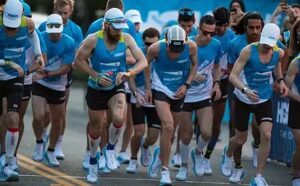I sort of just had a strange epiphany about tapers the other day. The realization was that there is a massive disconnect from how the outside world views and thinks about tapers, vs how coaches or maybe seasoned runners do.
I’m a part of a few coaching groups, where a couple of us running coaches get together and talk shop and share ideas. We started talking about tapers the other day and we were all weirdly in lock-step agreement. Somewhat rare for us. Just about all of us utilize approx a 10 day taper but with some quality all the way down close to race day. Just about every single one of us have BIG if not our biggest hardest/longest workouts 2 or 3 weeks out. And just about every single one of us said that our athletes are always surprised and a little nervous by this and they always think tapers are supposed to be long and extreme. Like 3-4 weeks of super low mileage, maybe even a handful of off days to get EXTRA fresh, and the biggest baddest long runs being farther away from the race so that there’s no residual fatigue.
And to that I would say, “Nah”.

I’m not exactly sure why that is, maybe the free marathon plans floating around on google painted this picture, maybe there was a famous book that outlined tapers in this way. I’m not sure, but I do know that we all sort of know that big dramatic tapers, on average, aren’t as successful. The main reason is, our body rises and falls to the demand of our training load and stimulus, when it can. It gets used to certain rhythms. Use it or lose, it in a way. MUSCULAR TENSION. If you talk to enough runners, most will have a story about how they tapered really well, mileage cut in half, no workouts, rested like crazy, and they got to the race and felt like crap. They couldn’t wake up, they never got going, they felt sluggish, or just a bit off. Often the reason for that is, when we slash our training load by too much, our bodies go into rest and vacation mode. Our bodies are smart enough to know when we aren’t consistently utilizing certain aspects of our fitness or our physiology. So it quits priming those systems. Why? Because our biology is remarkably efficient and lazy. Your lungs are not going to prime your aerobic threshold system if that system hasn’t been touched in weeks.
Every system has a certain time frame of when it starts to shut down, but we know that some of the processes around speed can fizzle in less than a week. Aerobic threshold isn’t far behind.
So we slowly start to drop things, we keep in smaller amounts of speed and threshold work so that the body stays engaged, but there’s a small enough drop in training loaded that we can achieve peak performance. For some folks it’s 2-3 weeks, some it’s only 6-7 days of a reduced training load. But we know where that puts on average to start from to help athletes run their best race. At the end of the day that is always the goal; help athletes run their best!



